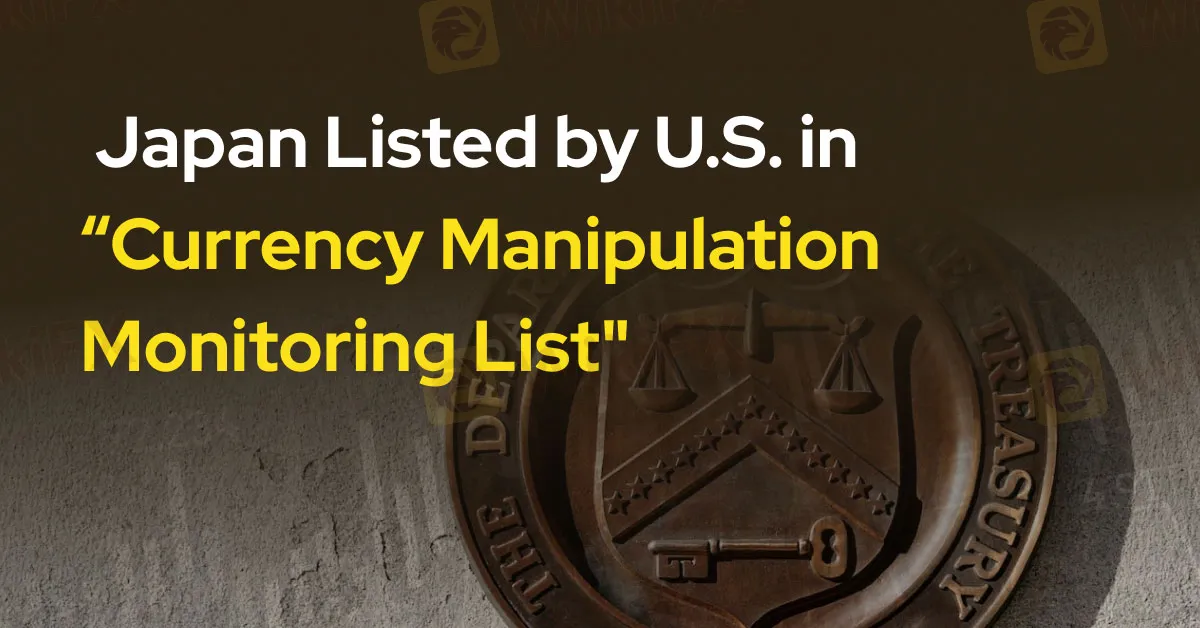简体中文
繁體中文
English
Pусский
日本語
ภาษาไทย
Tiếng Việt
Bahasa Indonesia
Español
हिन्दी
Filippiiniläinen
Français
Deutsch
Português
Türkçe
한국어
العربية
Japan Listed by U.S. in “Currency Manipulation Monitoring List"
Abstract:The U.S. Treasury Department said Thursday it has once again put Japan on a list of major trading partners that it monitors for potentially unfair foreign exchange practices. According to a June 21 report from Japan's Asahi Shimbun website, the U.S. Department of the Treasury announced on the 20th that Japan has once again been included in its "currency manipulation monitoring list."

The U.S. Treasury Department said Thursday it has once again put Japan on a list of major trading partners that it monitors for potentially unfair foreign exchange practices. According to a June 21 report from Japan's Asahi Shimbun website, the U.S. Department of the Treasury announced on the 20th that Japan has once again been included in its “currency manipulation monitoring list.” Analysts suggest that while the U.S. did not label Japan as a currency manipulator, placing it on the monitoring list serves as a warning. The United States, being the world's largest current account deficit country, closely scrutinizes countries and regions that accumulate significant trade surpluses with the U.S., suspecting deliberate currency depreciation to boost exports.
The U.S. Congress submits a report every six months on major trading partners' currency policies, and Japan has re-entered the monitoring list after a year. In 2023, Japan's trade surplus with the U.S. surged, with its current account surplus exceeding 3% of GDP, meeting the criteria set by the U.S. Treasury for inclusion in the monitoring list. Other countries and regions on the list include Germany, Malaysia, Singapore, Vietnam, mainland China, and Taiwan.
Japanese Finance Minister Taro Aso, speaking at a press conference after a Cabinet meeting on the 21st, commented on Japan being monitored again, stating, “This conclusion is based on mechanical evaluations by the U.S. regarding indicators such as the current account surplus and trade surplus with the U.S., and does not imply that the U.S. believes Japan's currency policy is problematic.”
Simultaneously, regarding Japan's interventions earlier this year to prevent a historic depreciation of the yen, the U.S. Treasury noted in its report, “Japan regularly discloses the results of its interventions, ensuring transparency.” Treasury officials interviewed on the 20th also expressed their view that Japan's currency policy is not problematic, describing Japan's interventions as counteracting competitive devaluation.

Disclaimer:
The views in this article only represent the author's personal views, and do not constitute investment advice on this platform. This platform does not guarantee the accuracy, completeness and timeliness of the information in the article, and will not be liable for any loss caused by the use of or reliance on the information in the article.
Read more

MultiBank Group Wins Big at Traders Fair Hong Kong 2024
Discover how MultiBank Group, a global leader in financial derivatives, secured three prestigious awards at Traders Fair Hong Kong 2024, highlighting its innovative trading solutions and industry excellence.

CySEC Settles Compliance Case with Fxview Operator Charlgate Ltd
Discover how CySEC resolved compliance issues with Charlgate Ltd, the operator of Fxview, through a €50,000 settlement. Explore the investigation, regulatory measures, and CySEC's new website designed for improved accessibility and transparency.

TradingView Launches Liquidity Analysis Tool DEX Screener
Discover TradingView's DEX Screener, a powerful tool for analyzing decentralized exchange trading pairs. Access metrics like liquidity, trading volume, and FDV to make smarter, data-driven trading decisions.

Doo Financial Expands Reach with Indonesian Regulatory Licenses
PT. Doo Financial Futures, a subsidiary of the global financial services brand Doo Group, has secured regulatory approval from Indonesia’s Badan Pengawas Perdagangan Berjangka Komoditi (BAPPEBTI).
WikiFX Broker
Latest News
Volkswagen agrees deal to avoid Germany plant closures
Geopolitical Events: What They Are & Their Impact?
Top 10 Trading Indicators Every Forex Trader Should Know
TradingView Launches Liquidity Analysis Tool DEX Screener
MultiBank Group Wins Big at Traders Fair Hong Kong 2024
WikiEXPO Global Expert Interview: Simone Martin—— Exploring Financial Regulation Change
'Young investors make investment decisions impulsively to keep up with current trends' FCA Reveals
Why Do You Feel Scared During Trade Execution?
CySEC Settles Compliance Case with Fxview Operator Charlgate Ltd
Malaysian Influencer Detained in Taiwan Over Alleged Role in Fraud Scheme
Currency Calculator


